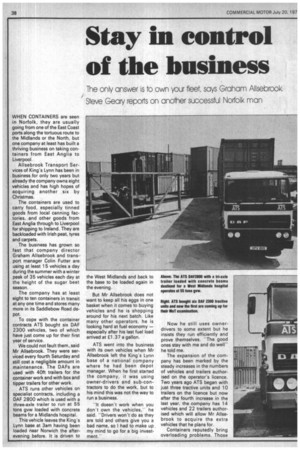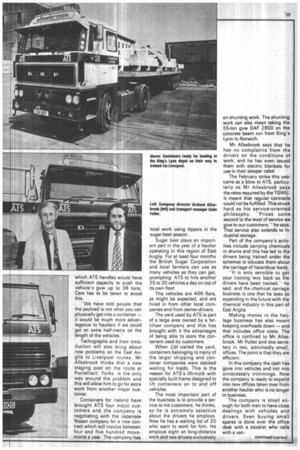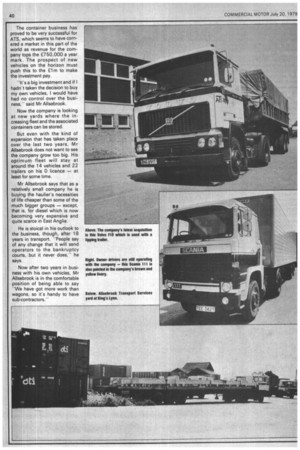Stay in control of the business
Page 40

Page 41

Page 42

If you've noticed an error in this article please click here to report it so we can fix it.
The only answer is to own your fleet, says Graham Allsebrook. Steve Geary reports on another successful Norfolk man
WHEN CONTAINERS are seen in Norfolk, they are usually going from one of the East Coast ports along the tortuous route to the Midlands or the North, but one company at least has built a thriving business on taking containers from East Anglia to Liverpool.
Allsebrook Transport Services of King's Lynn has been in business for only two years but already the company owns eight vehicles and has high hopes of acquiring another six by Christmas.
The containers are used to carry food, especially tinned goods from local canning factories, and other goods from East Anglia through to Liverpool for shipping to Ireland. They are backloaded with Irish peat, tyres and carpets.
The business has grown so fast that company director Graham Allsebrook and transport manager Colin Futter are using at least 15 vehicles a day during the summer with a winter peak of 35 vehicles each day at the height of the sugar beet season.
The company has at least eight to ten containers in transit at any one time and stores many more in its Saddlebow Road depot.
To cope with the container contracts ATS bought six DAF 2300 vehicles, two of which have just come up for their first year of service.
We could not fault them, said Mr Allsebrook. They were serviced every fourth Saturday and still cost a negligible amount in maintenance. The DAFs are used with 40ft trailers for the container work and with box and tipper trailers for other work.
ATS runs .other vehicles on specialist contracts, including a DAF 2800 which is used with a three-axle trailer to run at 55 tons gvw loaded with concrete beams for a Midlands hospital.
This vehicle leaves the King's Lynn base at 3arn having been loaded near Norwich the afterevening before. It is driven to the West Midlands and back to the base to be loaded again in the evening.
But Mr Allsebrook does not want to keep all his eggs in one basket when it comes to buying vehicles and he is shopping around for his next batch. Like many other operators, he is looking hard at fuel economy — especially after his last fuel load arrived at £1.37 a gallon.
ATS went into the business with its own vehicles when Mr Allsebrook left the King's Lynn base of a national company where he had been depot manager. When he first started the company, it was using owner-drivers and sub-contractors to do the work, but to his mind this was not the way to run a business.
"It doesn't work when you don't own the vehicles," he said. "Drivers won't do as they are told and others give you a bad name, so I had to make up my mind to go for a big investment." Now he still uses ownerdrivers to some extent but he insists they run efficiently and prove themselves. "The good ones stay with me and do well" he told me.
The expansion of the company has been marked by the steady increases in the numbers of vehicles and trailers authorised on the operator's licence. Two years ago ATS began with just three tractive units and 10 trailers on the licence but now after the fourth increase in the last year, the company has 14 vehicles and 22 trailers authorised which will allow Mr Allsebrook to acquire the extra vehicles that he plans for, Containers reputedly bring overloading problems. Those which ATS handles would have sufficient capacity to push the vehicle's gvw up to 36 tons. Care has to be taken to avoid. this.
"We have told people that the payload is not what you can physically get into a container — it would be much more advantageous to hauliers if we could get an extra half-metre on the length of the vehicles.
Tachographs and their introduction will also bring about new problems on the East Anglia to Liverpool routes. Mr Allsebrook thinks that a new staging post on the route at Pontefract, Yorks, is the only way around the problem and this will allow him to go for extra work from another major customer.
Containers for Ireland have brought ATS four major customers and the company is negotiating with the Japanese Nissan company for a new contract which will involve between four and five hundred movements a year. The company has local work using tippers in the sugar-beet season.
Sugar beet plays an important part in the year of a haulier operating in this region of East Anglia. For at least four months the British Sugar Corporation and local farmers can use as many vehicles as they can get, prompting ATS to hire another 25 to 30 vehicles a day on top of its own fleet.
The vehicles are 40ft flats, as might be expected, and are hired in from other local companies and from owner-drivers.
The yard used by ATS is part of a large area owned by a fertiliser company and this has brought with it the advantages of being able to store the containers used by customers.
When CM visited the yard, containers belonging to many of the larger shipping and container companies were stacked waiting for loads. This is the reason for ATS's lift-truck with specially built frame designed to lift containers on to and off vehicles.
The most important part of the business is to provide a service to his customers, he thinks, so he is extremely selective about the drivers he employs. .Now he has a waiting list of 20 who want to work for him. He empioys eight on long-distance work and two drivers exclusively on shunting work. The shunting work can also mean taking the 55-ton gvw DAF 2800 on the concrete beam run from King's Lynn to Norwich.
Mr Allsebrook says that he has no complaints from the drivers on the conditions of work, and he has even issued them with electric blankets for use in their sleeper cabs!
The February strike this year came as a blow to ATS, particularly as Mr Allesbrook pays the rates required by the TGWU. It meant that regular contracts could not be fulfilled. This struck hard as his service-oriented philosophy. "Prices come second to the level of service we give to our customers," he says. That service also extends to industrial storage.
Part of the company's activities include carrying chemicals in drums and this has led to the drivers being trained under the schemes to educate them about the carriage of hazardous loads.
"It is only sensible to get your training levy back so the drivers have been trained," he said, and the chemical carriage business is one that he sees as expanding in the future with the chemical industry in this part of East Anglia.
Making money in the haulage business has also meant keeping overheads down — and that includes office costs. The office is confined to Mr AlIsebrook, Mr Futter and one secretary in two, admittedly small, offices. The point is that they are efficient.
In this company the cash has gone into vehicles and not into unnecessary trimmings. Now the company is ready to expand into new offices taken over from another haulier who is no longer in business.
The company is small enough for both men to have close dealings with vehicles and drivers. Even buying small spares is done over the office desk with a stockist who calls with a van. The container business has proved to be very successful for ATS, which seems to have cornered a market in this part of the world as revenue for the company tops the £750,000 a year mark. The prospect of new vehicles on the horizon must push this to the £1m to make the investment pay.
"It's a big investment and if I hadn't taken the decision to buy my own vehicles, I would have had no control over the business," said Mr Allsebrook.
Now the company is looking at new yards where the increasing fleet and the associated containers can be stored.
But even with the kind of expansion that has taken place over the last two years, Mr Allsebrook does not want to see the company grow too big. His optimum fleet will stay at around the 14 vehicles and 22 trailers on his 0 licence — at least for some time.
Mr Allsebrook says that as a relatively small company he is buying the haulier's necessities of life cheaper than some of the much bigger groups — except, that is, for diesel which is now becoming very expensive and quite scarce in East Anglia.
He is stoical in his outlook to the business, though, after 18 years in transport. "People say of any change that it will send operators to the bankruptcy courts, but it never does," he says.
Now after two years in business with his own vehicles, Mr Ailsebrook is in the comfortable position of being able to say "We have got more work than wagons, so it's handy to have sub-contractors.




















































































































